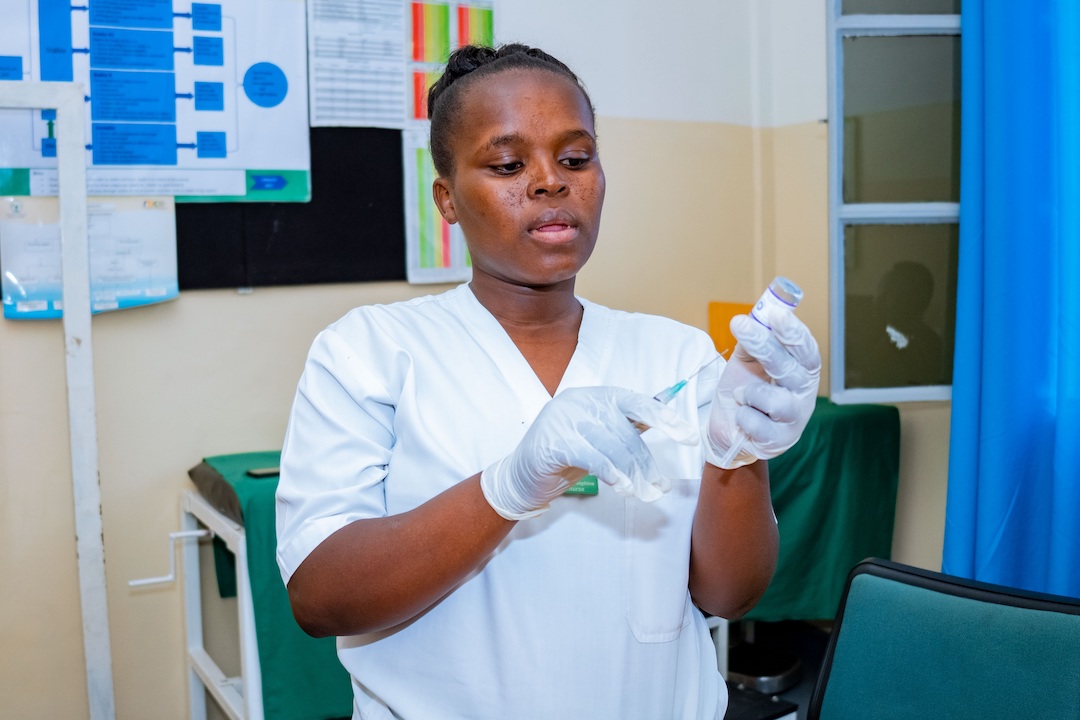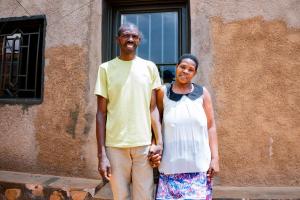Eliminating hepatitis
Kigali ‒ When Jean Paul Nduwumwe decided to have a hepatitis test while accompanying his pregnant wife on a clinic visit, he had no idea that following a positive result and three months of treatment his health and well-being would be restored, and he would feel “reborn”.
A resident of Gasabo District, just outside Rwanda’s capital, Kigali, Nduwumwe had been suffering from an unknown illness. He was so sick that he could not sit down, could not sleep and could no longer walk even short distances.
“I urge everyone to get tested. Health workers are ready to take care of you if you test positive.” Jean Paul Nduwumwe, cured of hepatitis C infection
The test that day, part of Rwanda’s comprehensive strategy to eliminate hepatitis, likely saved his life. Viral hepatitis, an inflammation of the liver which can lead to scarring of the liver (cirrhosis) or even liver cancer, is known as a silent killer because people often experience no obvious symptoms, until the infection causes serious health complications.
Rwanda is one of seven countries worldwide that were assessed and selected in 2018 by World Health Organization (WHO) to pilot the validation of viral hepatitis elimination as a public health threat. “This exercise stimulated Rwanda to work harder towards reaching hepatitis elimination targets,” says Dr Janvier Serumondo, director of the sexually transmitted infections and other blood-borne infections unit at the Rwanda Biomedical Centre.
Rwanda has transformed its prevention, treatment and care of hepatitis, achieving all its national targets. This includes the screening of over 7 million people aged 15 and older, initiating 60 000 people on treatment and reducing the prevalence of hepatitis C infection to less than 1%. Rwanda is on track to reach its own target of achieving elimination of hepatitis C by 2024, surpassing the WHO’s 2030 target deadline.
“WHO commends the Government of Rwanda on their achievements and will continue to support the country’s efforts towards elimination.” Dr Muhayimpundu Ribakare, WHO Rwanda
The government implemented a range of key interventions to achieve these results. Health services for people with hepatitis were decentralized to the lowest levels of care. Task-sharing from doctors to nurses has been implemented, with nurses trained to screen and treat straightforward cases at primary health care level, under a doctor’s supervision, and to refer complicated cases to an advanced health care level.
Rapid test results are available in 20 minutes and the government also negotiated a 20-fold reduction in drug procurement costs to offer free treatment to all patients. “These strategies have been tremendously important and increased access to testing and treatment,” says Dr Serumondo.
Nurse Marie Rose Kwitonda, who works in the hepatitis department of the Gikondo Health Center, a primary health care facility in Kigali, says the upskilling of health workers like herself, capacitating them to test and treat patients, has been invaluable.

“It changed the workflow drastically. Before, we used to run countrywide campaigns to find and screen people for hepatitis. These days we test almost everyone who enters the clinic on any given day,” she says.
WHO has played a central role in providing global guidelines and technical guidance towards the development and adaptation of national guidelines to the Rwandan context. According to Dr Serumondo, the Organization monitors progress towards the elimination targets and keeps the country on track.
“WHO has been alongside the government of Rwanda every step of the way since the launch of the national elimination plan in 2018,” says Dr Muhayimpundu Ribakare, WHO Rwanda’s programme officer for hepatitis. “WHO commends the Government of Rwanda on their achievements and will continue to support the country’s efforts towards elimination.”
Nduwumwe’s recovery is evidence of the effectiveness of the treatment, and he is now back at work as a house painter. “I urge everyone to get tested. Health workers are ready to take care of you if you test positive,” he says.
